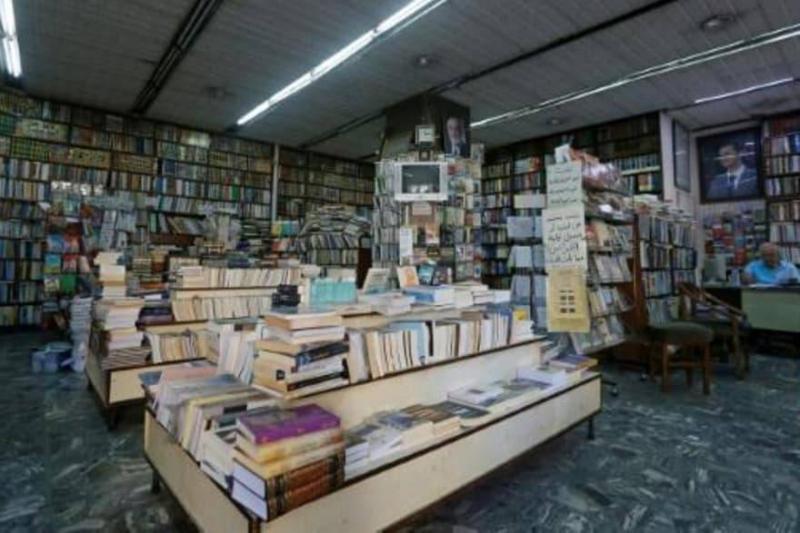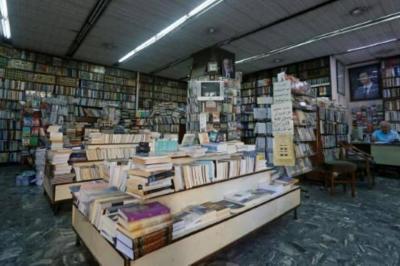In Damascus, which has always been a meeting point for intellectuals, prestigious publishing houses struggle to keep their doors open, after several libraries that shaped the cultural scene had to close and some turned into clothing or food stores. Muhammad Saleh Nouri (71 years old), son of Hussein Nouri, founder of one of the oldest libraries in Damascus, told Agence France-Presse, "We carry the name of the oldest library in Syria, and we wanted it to remain for our children and grandchildren, but the state of reading and culture has significantly declined." The Nouri family currently runs two libraries in Damascus, one of which was established in 1930. In the library located on Al-Barid Street, Nouri supervises the modest sales operations. He expresses fear that "Nouri Library is threatened with closure, as well as other libraries," because "people cannot afford the cost of reading, and libraries cannot cover their expenses." Three years ago, the family was forced to close a library it established in Damascus in 2000 called "World of Knowledge." The doors were shut, but the books inside remain as they are, filling the shelves and covered in dust. On a wooden desk, the Nouri family keeps old photos of family members and notable visitors to the library, including politicians, artists, and poets. The decision came after years of war in Syria since 2011 exhausted them financially, and they could no longer "bear their material expenses," according to Nouri.
In recent years, the pace of library closures and the downsizing of well-known publishing houses, which enriched the Arab library with their works and translations, has accelerated. Last month, the prestigious Nobel Library bid farewell to the cultural scene, following the footsteps of the Arab Awakening Library established in 1939, which became a shoe store, and the Maysalon Library, which turned into a currency exchange, along with other libraries that have gradually disappeared. Alongside the economic reasons, Sami Hamdan (40 years old), a third-generation manager of Al-Yaqtha Publishing House, told Agence France-Presse, "Technology has pushed entire generations towards e-books, distancing them from print books." When it closed in 2014, Al-Yaqtha had published more than 300 books and was forced to liquidate tens of thousands of copies. According to Hamdan, "the war decimated what remained" of a cultural scene that was already in decline. He explains, "We were not immune to the global shift towards digitization, but during the war, no one wanted to invest their money in a library."
With a decade of war driving around ninety percent of Syrians below the poverty line, they now struggle to secure their daily sustenance and basic needs amidst a crippling economic crisis, shortages of raw materials, and a collapse of the local currency against the dollar, which negatively impacted all productive sectors, including printing. Khalil Haddad (70 years old), one of those in charge of Dar Osama Publishing and Distribution, founded in 1967 and struggling to keep its doors open, believes "it is a luxury to invite people to buy books in these circumstances, as people's priorities focus on food and shelter." The man, who has spent his life among books and libraries, continues to come to work even on days "when we don't sell a single book." He explains how "the rise in prices and the increase in the costs of paper and printing, along with logistical difficulties such as power outages, have led to higher book prices and a reluctance among readers to buy."
Six years ago, the famous Dar Damascus Library, founded in 1954, turned into a stationery store in an attempt to preserve it. But at its old wooden door, Amer Tanbaji, son of the founder, hangs a sign "For Sale," thus announcing the nearing end of a journey that lasted around seventy years. Tanbaji (39 years old) explains to Agence France-Presse, "We are looking to sell it if a buyer is available," although, "I feel sad if it turns into anything else." Like other publishing houses, the ability to print and import books from abroad has gradually declined due to the collapse of the lira and obstacles stemming from economic sanctions against Syria.
After once receiving around 800 publications daily before the conflict, the number of publications currently does not exceed five, according to Ziad Ghosn, the former director of the official Unit for Press, Printing, Publishing, and Distribution in Syria. The increase in the cost of paper and printing has been estimated at around 500 percent in the last two years alone, in addition to rising transportation and labor costs by more than 100 percent.
The situation related to the COVID-19 pandemic worsened in recent weeks with continuing stagnation in vaccination rates, while cold weather drives more people indoors... The COVID-19 pandemic deprived Syrians of the enjoyment of reading daily newspapers, following a decision issued by the Ministry of Information in March 2020, which is still in effect.
From a large library on a main street in Damascus to a small basement, publisher Samer Haddad transferred the legacy of her father, Simon Haddad, who founded Dar Atlas in 1955 and used to showcase "rare books and the latest releases and translations." With only one part-time employee, Haddad tries to keep the momentum of book publishing, albeit with difficulty, maintaining a pace of seven books annually instead of more than 25 at least before the war. She explains to Agence France-Presse, "What we noticed during the years of war is that we lost a large portion of our readers... many of them emigrated." Nevertheless, what drives her to continue working is the preservation of her father's heritage. She states emphatically, "Our efforts to survive are desperate; I will not close Dar Atlas Library."




